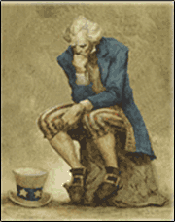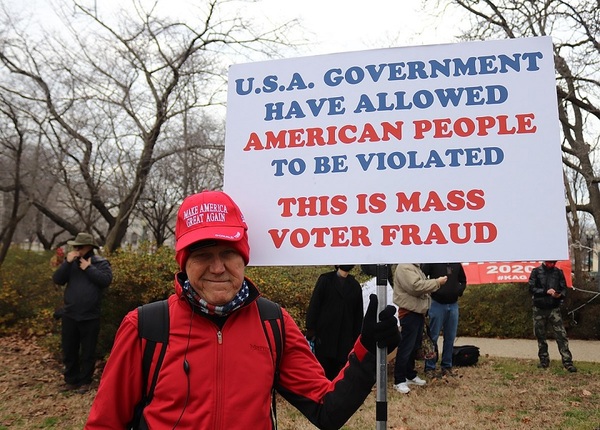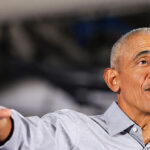
–>
November 26, 2022
Everything I need to know about the 2022 elections, I learned from Guys and Dolls.
‘); googletag.cmd.push(function () { googletag.display(‘div-gpt-ad-1609268089992-0’); }); }
My parents met at a Young Republican Halloween party in Chicago in the late 1950s. They were precinct captains and election judges, first in Chicago, then in Evanston, where we moved when I was one. Some of my earliest memories include walking precincts, collating brochures, and even sitting in a playpen in the polling place, as my parents honestly counted the votes, late into the evening.
That childhood prepared me for a lot of elections, but not this year’s.
The plot of Frank Loesser’s classic musical Guys and Dolls revolves around Nathan Detroit’s floating crap game. While the game itself is technically illegal (like most activities in America today, gambling is only legal if the government gets a cut), a night of gambling is profoundly ethical. Each game, from poker to blackjack, has clear rules to which everyone agrees in advance; you have witnesses watching the play of the hand to keep it honest; you have to pay your debts promptly.
‘); googletag.cmd.push(function () { googletag.display(‘div-gpt-ad-1609270365559-0’); }); }
Until that sudden, jarring moment in which Chicago gangster Big Jule shows up and forces them all to play with his dice, which are just plain cubes, without spots, because he says he “had the spots removed for luck,” but that’s okay because he remembers where the spots formerly were. Why use Big Jule’s dice? Because Big Jule has a gun, and he can’t possibly win with honest dice.
The cast is horrified. Nobody ever questioned Nathan Detroit’s crap game before, because he ran an honest game; now all of a sudden, this thug shows up, packing heat and changing the rules, cheating to steal from all the honest gamblers in the room.
For a long time now, but especially in 2020 and 2022, American elections have been compromised by vote fraud. New York’s Tammany Hall was the most famous example in the 1800s. Everyone knew that LBJ stole his first congressional seat in Texas with Ballot Box 13. It’s been so well accepted that Chicago vote fraud put John F. Kennedy over the top in 1960 that politicians, including JFK himself, have joked about it for generations.
So, Democrat vote fraud in America is nothing new. It’s been so deeply factored into American politics that every Republican candidate, in planning his campaign and reviewing his polling, asks not the question “can we win?” but rather, “can we overcome the margin of fraud?”
Three things have changed in recent years.
First, the universal knowledge that vote fraud was baked into the system has suddenly become an unspeakable statement. Acknowledge its existence and you’re called an “election denier.” You must join the establishment in parroting the pretense that “there is no vote fraud at all,” or you are cancelled.
‘); googletag.cmd.push(function () { googletag.display(‘div-gpt-ad-1609268078422-0’); }); } if (publir_show_ads) { document.write(“
Second, Democrats have become more and more blatant about it. If we were told that Republicans lost cities like Chicago, Cleveland, and New York by margins of four to one, or even five to one, we began to believe that such wipeouts might indeed be possible. It probably never was. We so love and trust our system, we just accept the idea that nine out of ten city dwellers might indeed all be Democrats, when we’re a 50-50 country, or at worst a 60-40 country, everywhere else. People started to wake up after the 2012 election, when Cleveland reported whole wards as voting 100% for Barack Obama. Come on. When the black community has been, at worst, a 90-10 demographic, we’re supposed to believe there were entire wards without a single Romney vote? Not possible.
 Third, and perhaps most disturbing, is how the rules have been changed to actually allow fraud.
Third, and perhaps most disturbing, is how the rules have been changed to actually allow fraud.
For an election to work — to be an accurate representation of the public will — it must be held on a single day (so all voters can be verified, and can all have the same information at decision time) and it must be on secure paper ballots (so that it is auditable). The Democrats have spent a generation whittling away these protections and more.
Today, ballots are mailed out by the millions — anyone can register on the spot, eliminating the possibility of verification — and easily programmable computers are used, enabling distant programmers to change the results so any “recount” just reconfirms the work of the programmers instead of the wishes of the voters.
We long banned the exchange of food, drink, or cash for voting. Today, Democrats host registration and even voting rallies where free food and booze are provided. We long demanded picture ID to ensure voter identification. Today, Democrats call you a racist or a voter suppressor for proposing it. We banned ballot harvesting to ensure that voters were not coerced. Today, ballot harvesting is demanded, ostensibly for the ease of voters too lazy to go to the polls.
And after centuries of a primary and caucus system to give general election voters clear choices, the nonpartisan jungle primary of California and the abomination of “ranked choice voting” in Alaska have been implemented to trick Republicans into unwittingly electing Democrats.
Why? How did it get this way?
Gradually, over the years, we took it for granted that our system was strong enough to withstand any attack. We told ourselves that the Constitution was a solid foundation that would carry us through any crisis.
But what we failed to realize was that these assaults were actually compromising the Constitution itself; we can’t expect it to protect us after we’ve destroyed it.
- By passing the 17th Amendment and removing the state legislatures from the selection of the U.S. Senate, we cracked that foundation.
- By misinterpreting the 14th Amendment to allow birthright citizenship for the children of noncitizens, diluting our electorate with voters not raised to appreciate the Founding Fathers’ philosophy, we cracked that foundation.
- By tolerating election abuses like those listed above, institutionalizing the ability of the establishment to ensure the “election” of their choices instead of the public’s, we are destroying that foundation.
America can be saved. We know from polling, we know from our six-million vote plurality nationwide this fall, that it’s not too late to return to the City on a Hill that our Founding Fathers intended for us.
But it will take action, and every year that we tolerate these assaults on our wonderful system, it gets harder and harder to fix.
We must return to a nation of laws. We must return to one single election day, with a monthlong pre-registration period to allow the system to weed out the deceased, the moved-away, and the fabricated from the voting rolls. We must make vote fraud a serious felony. And we must have fully-auditable paper ballots, secure and verifiable from beginning to end.
Back to Guys and Dolls for a moment.
Nathan Detroit had run his honest game for twenty years, and then, one powerful gangster threatened the destruction of the system. How did they respond? Nobody pretended the no-spot dice were real. Nobody pretended Big Jule’s new rules were legitimate. Sky Masterson knocked him out cold, so Nathan could permanently eject him from the game, immediately reinstituting honest dice and restoring confidence in the system.
The Katie Hobbses of the American establishment are today’s Big Jules, remaking the election process so that only they can win, and so that Republicans can only lose.
It is time for the American people to choose. Will we allow Big Jule to rule us forever, or will we be Sky Masterson, reforming our corrupted system, returning America to the rule of law, with honest elections again?
There is no time to waste. America must be fixed in 2023, or there may as well be no 2024.
Image: Elvert Barnes
<!– if(page_width_onload <= 479) { document.write("
“); googletag.cmd.push(function() { googletag.display(‘div-gpt-ad-1345489840937-4’); }); } –> If you experience technical problems, please write to helpdesk@americanthinker.com
FOLLOW US ON
<!–
–>
<!– _qoptions={ qacct:”p-9bKF-NgTuSFM6″ }; ![]() –> <!—-> <!– var addthis_share = { email_template: “new_template” } –>
–> <!—-> <!– var addthis_share = { email_template: “new_template” } –>







